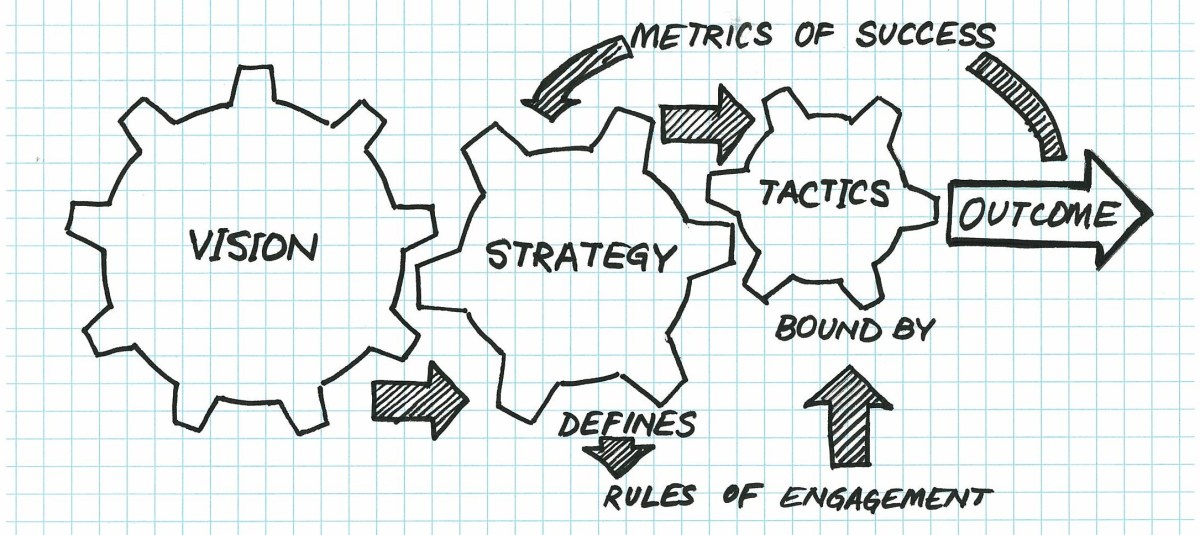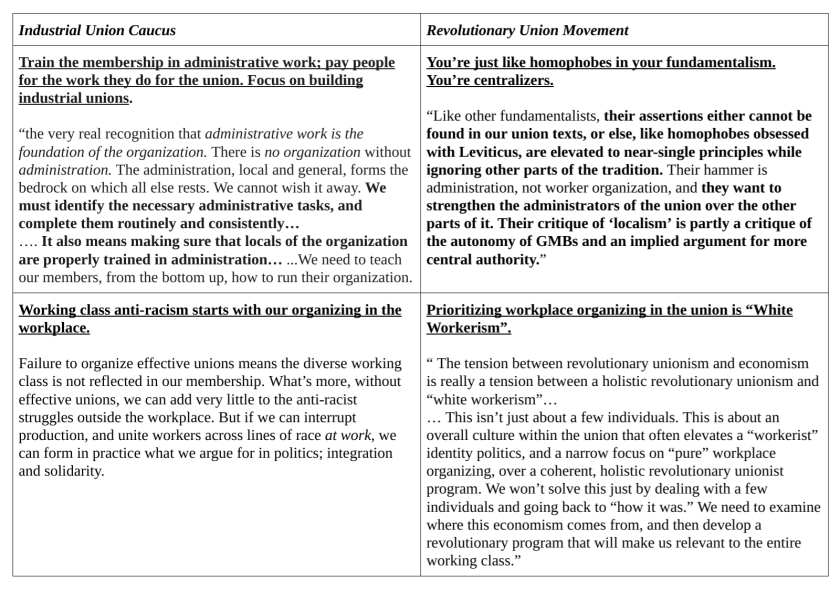This is a post from the IWW’s Website describing Recycling Workers’ fights for a better contract in Berkeley California. It is reproduced here because their efforts show the strengths and weaknesses to contract bargaining and offer ample content for discussion on this front. The original authors are not members of the Industrial Unionist Caucus.
The contract negotiations between the Bay Area IU 670 Recycling Workers Union and the two Berkeley Recycling Companies has been a challenging struggle, but workers have stepped up to fight for tremendous improvements. The Bay Area IWW represents drivers at The Ecology Center who do residential curbside pickup, and workers at The Community Conversation Center yard who sort and process recycling materials. Both workers have been waging shopfloor struggles to resolve grievances and improve their working conditions. With both contracts coming up for negotiations, workers stepped up the fight.
The drivers met several times both at work and outside of work to draft an ambitious list of roughly 15 demands including an across the board wage hike, increase in pension payments by the company, and a change to the current accident penalties. The existing agreement resulted in termination of any driver who was involved in three accidents incurring more than $1400 worth of damage. With the narrow winding streets of Berkeley and the increasing costs of small accidents like broken rear-view mirrors, we have seen several workers purposefully dropping down to a loader after two incidents. This has resulted in wage decreases of up to $10 per hour!
Several months before negotiations began, workers were engaged in direct action to maintain control over job conditions. Management had attempted to add an additional route, and eliminate several “duo” routes – routes picked up by a team of one driver and one loader. After a week of headaches under these new route assignments, workers met with IWW organizers outside of work to plan how they would get back the old route system.
On September 10, all of the workers met with Daniel Maher, the operations manager and by a unanimous show of hands, demanded that the routes be reset. Maher refused to agree and left the office. One hour later he returned to find that that the workers hadn’t budged – neither physically nor on their demands. In what amounted to a seven-hour standoff, the entire workforce for the day refused to drive the trucks and occupied the company office for the entire time.
The crew from the buyback yard, who were holding a safety meeting at the time, were informed about the action and decided to march over to the Ecology Center office in solidarity. Daniel was still refusing to agree to the route change as the drivers discussed their situation to buyback workers.
With the office filled to capacity by recycling workers from both shops, Martin Borque, executive director of The Ecology Center was called in to put out the fire. He tried to argue that the changes the company had made would benefit the workers, but the union knew better. When it was obvious that the crew would not back down, management conceded to all demands. They then tried to get the drivers to agree to perform all assigned work for the day. Since that would have had the guys driving well into the night, they refused, promising only to work until 5:30 PM. Again, management had no choice but to agree.
At approximately 1:00 PM the trucks all rolled out, smiles on the workers’ faces and the stage was set for the coming negotiations, with workers in the driver’s seat.
The start of negotiations was heard loud and clear on November 8th at a rally in the Berkeley Recycling yard. The drivers took a break in the middle of their route to come back to the yard, and the workers from the Conservation Center walked off their posts to attend. Among piles of recycled waste the two groups of employees laid out their demands via bullhorn and several individuals spoke about conditions at their workplace and how workers had to come together to fight for a better life. The Rally finished with a 40-person strong march to the Ecology Center office where Fellow Workers Joyce Guzman outlined the demand list to Maher.
The buyback workers had also been compiling their demands via an employee survey which asked workers what most needed improvement at work. Bargaining teams of four employees and three IWW organizers were elected for each shop and the bargaining sessions began. At the Ecology Center the bosses were quick to give in to several demands including an unprecedented wage increase. No doubt this was due to the strength and solidarity workers had demonstrated just a few months prior.
But by the same token, management was scrambling to eliminate the basis for their employees’ power to stop production. They demanded several destructive changes to the contract language including a no-strike clause, a managements rights clause (both traditional clauses had been absent from the Ecology Center contracts with the IWW for almost two decades), and the elimination of the union solidarity clause which allowed the workers to honor picket lines during the life of the contract.
Workers were conflicted, wanting the economic package management had proposed but offended by the affront to their rights. After negotiations went back and forth some compromises were reached. On wages, Route Driver A will go from the current $24.87 to $26.50 and Driver B will go from 22.96 to 24.50 for this coming year, with a wage and benefits reopener for 2009. Most “loaders” (assistants) will go into a new category of “assistant driver” and their pay will go from the current $16.80 to $21 per hour. The few who will remain as loaders (because they can’t drive the trucks) will go to $19.00. Improvements were also made in health benefits and
On the negative side, workers accepted some changes to the contract that weren’t exactly positive. While they refused to accept the elimination of the union solidarity clause, and management backed down, there now exists a general “Managements Power” section, and while they would not accept a No-Strike clause, per se, the grievance procedure has been modified so that the union agrees to take no strike action until the grievance procedure has been exhausted.
Meanwhile at Buyback, a committee of 4 workers and three IWW organizers were attempting to hammer out a contract with management. The main demands were a wage hike, decreasing the health care costs, and increasing management’s contribution to the workers’ IRA. Management agreed to some of the union proposals, but dragged its heels on the wage demand. After two months of negotiations and an implicit threat of a strike by the workers, the bosses increased their offer for a new wage table. At the time of this writing, the workers are closing in on an agreement with management though some issues are still unresolved. Why do Buyback workers so badly need a raise? Fellow Worker Matt Wathen wrote the following article about the conditions workers have to deal with at the yard.
My name is Matthew Wathen and I have been an employee at Berkeley Recycling going on three years now. Over these three years I have seen and been exposed to some of the most vile substances and materials known to man. Working on the container line I’ve seen everything from dead rats covered in maggots to human feces to used syringes pass by. Having to grab the syringes and put them in a special biohazard waste basket we’re extra careful we don’t accidentally poke ourselves (God forbid). While sorting recyclables on the container line I’ve been attacked by mosquitoes, had different substances sprayed on my face and have had to go to the hospital to get stitches from grabbing glass bottles even though I was wearing glass protective gloves.
Down by the paper line it’s hard to take one step without stepping on a pile of rat droppings. I think Berkeley Recycling is home base for the entire population of rats in the city of Berkeley. Even though management has done a lot to rid our work site of rat infestation, they still roam around freely like they own the place. I say put ’em to work!
Another sanitary concern is the mess left by customers after they’re finished separating their materials. The customers are given a certain section in the facility to sort their materials, and by the end of the day that area is left knee-deep in garbage, which the employees are left to clean up. Some of the garbage left on the ground consists of everything from spilled food, half-empty drink containers, broken glass, dirty socks and all sorts of disgusting filth. Also since many of the customers are drug addicts and IV drug users, we constantly are finding drug paraphernalia and used syringes on the premises.
Now everything that I have mentioned so far, as you can imagine puts the employees at great risk, so being the end of the year, the time has come for union workers and management to negotiate a new contract. The starting pay here is only $11.05 per hour (keep in mind we have families to support). Because the cost to live in the Bay Area is so expensive and because of the risks of sanitary conditions, not to mention the risks of accidents caused by heavy machinery (which have happened), we have asked for an immediate increase of five dollars per hour.
Their counter offer is fifty cents.
By M.K. and other members of the Bay Area Utility Service Workers iu670 industrial organizing committee.







